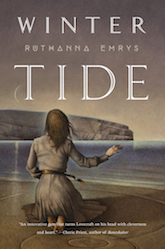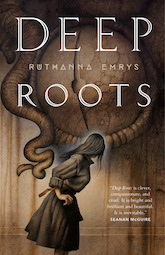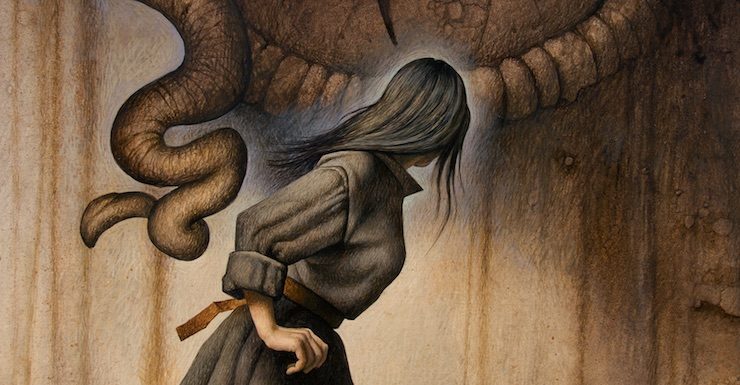Growing up as a genre-loving child in the United States during the 1980s, there were figures and faces that couldn’t be avoided. It didn’t matter whether you liked epic fantasy or not: odds were good that you would know who Tolkien was, and be able to explain, at least in broad strokes, the story he’d been trying to share. Stephen King, Ray Bradbury, C.S. Lewis, they all loomed large over the literary landscape we were trying to transverse, setting the shape of the world around us. There were women among their number—Anne McCaffrey, James Tiptree, Jr., A.C. Crispin—but they weren’t very common, and they rarely seemed to sink their roots as deeply.
And then there was H.P. Lovecraft.
As a little girl sneaking horror novels in the rear stacks of my local library, I knew that something was off about Lovecraft’s way of looking at the world, but it would be years before I realized that the primary difference between his mythos and the worlds created by other authors was that he didn’t really seem to want me there. Women, in his reality, were either absent, cruel, or channels for terrifying entities from beyond space and time.
By the time I was in my teens, two narratives were warring for control of Lovecraft’s legacy: the people who cried that it shouldn’t matter what kind of man he’d been, not when he’d left us such remarkable stories, and the ones who stood up and said that no, it did matter: that women and people of color and everyone else deserved to be a part of the sprawling shared universe he had accidentally created. That if Cthulhu was coming to devour the world, we all deserved to have a say in stopping him.
I’ll be honest: the whole discussion was distressing for me, from a whole lot of directions, because you can’t get away from Lovecraft. Like Tolkien, timing and a certain vividness of imagery meant that he was able to get in on the ground floor of his genre’s modern face. It doesn’t matter if you ever read Lovecraft. His fingerprints are everywhere in modern horror, filtering through other hands to influence new writers who might well be horrified to learn how much they’ve taken, however tangentially, from a man who is now widely recognized to have been racist, misogynistic, and prejudiced, not just for his time, but for all of time.
(Yes, there is an argument to be made that understanding grows and changes, and that what seems bigoted today was perfectly acceptable yesterday. I’d like to note that the people making this argument are almost never of the group being discriminated against—historical racism seems a lot easier to swallow when it’s not being aimed at you. But also, even when racism, or sexism, or general bigotry was “more acceptable” than it is now, there have always been people who pushed even that envelope, holding and espousing beliefs that were not considered appropriate at any time. Lovecraft, sadly, based on his own work as well as the work of his peers, was among the latter.)
Buy the Book


Winter Tide (The Innsmouth Legacy)
If you read horror, you have read narratives that were influenced by, if not wholly inspired by, Lovecraft. And if you’re like me, at some point you’ve stopped and asked yourself whether this means you’re continuing to support a genre that doesn’t really want you there.
A personal note: I have become very, very cautious about reading anything that says it’s influenced by the Cthulhu Mythos, because half the time, that means “I wanted to be really sexist/racist/both, and this seemed like the best way to get away with it.” So when I received an ARC of Ruthanna Emrys’s Winter Tide from my publisher, I opened it mostly out of politeness. I’ll at least try to read everything, even if I bounce off half of it.
Instead, I lost several hours of my life, and did a few angry laps around my house, hating the fact that I hadn’t come up with the idea for the book first. Here, finally, was the perfect refutation of Lovecraft’s toxic side: here was a Mythos that had been cracked open like a crab, lain bare so that we could pick at its innards. It was perfect. It is still, if you haven’t read it, perfect. It could have been the end, and I would have been content—and I was, I think understandably, a little wary when the sequel was announced, because I wanted more, but how could anything else ever be so perfect.
Deep Roots is not perfect. It can’t be. It lacks the blazing newness of Winter Tide, which was a powerful enough force to make any small errors forgivable: it’s not the first step in a journey, and that makes it easier to see the flaws. It is, instead, essential, and should be required reading for anyone who wants to explore the stages of grief. Aphra, our main character and entry into this world, is grieving. She spends the book realizing that the solution to diaspora is not going home, because you can’t; you can’t walk back into the house that made you once it’s been burnt and gutted and expect everything to be precisely the way it was before it all fell down. The world doesn’t work that way. Not for Aphra. Not for anyone.
Buy the Book


Deep Roots (The Innsmouth Legacy)
I described Deep Roots to a friend as “one long, primal scream of a book,” and I wasn’t wrong; everything in this story is an ache that can’t be healed, a wound that needs to be cleaned and stitched and forgiven, because it’s going to scar. It has to scar. There is no other way through the story.
If Winter Tide was the book my child’s heart needed to let me make my peace with Lovecraft’s flaws, Deep Roots is the book that says “finding the flaws doesn’t mean they must be forgiven, or that they ever can be; finding the flaws simply means that you don’t get to be innocent of them anymore.”
These books are gorgeous on their own, but they don’t exist on their own, and they’re never going to have the opportunity to do so: they exist as part of our modern literary conversation with Lovecraft’s works, and in that context, they are simultaneously unique and invaluable. They provide a view on the Mythos—which was, after all, never solely Lovecraft’s to begin with—that says we are all welcome, and they do so within the framework of brilliantly plotted, effortlessly paced, utterly human stories.
I think this is my favorite series of the last decade. I know it’s helping to heal wounds my heart has been carrying since I was a little girl, since I was too word-starved to explain why it hurt.
And that’s amazing.
Winter Tide is available now from Tor.com Publishing. Deep Roots publishes July 10th.
Read chapters 1-5 of Winter Tide here.
 Seanan McGuire is the author of the October Daye urban fantasy series, the InCryptid series, and several other works, both standalone and in trilogies. She lives in a creaky old farmhouse in Northern California, and was the winner of the 2010 John W. Campbell Award for Best New Writer. In 2013 she became the first person ever to appear fives times on the same Hugo ballot. The Wayward Children novella series —Every Heart a Doorway, Down Among the Sticks and Bones, and Beneath the Sugar Sky—is available from Tor.com Publishing
Seanan McGuire is the author of the October Daye urban fantasy series, the InCryptid series, and several other works, both standalone and in trilogies. She lives in a creaky old farmhouse in Northern California, and was the winner of the 2010 John W. Campbell Award for Best New Writer. In 2013 she became the first person ever to appear fives times on the same Hugo ballot. The Wayward Children novella series —Every Heart a Doorway, Down Among the Sticks and Bones, and Beneath the Sugar Sky—is available from Tor.com Publishing










